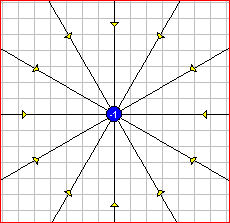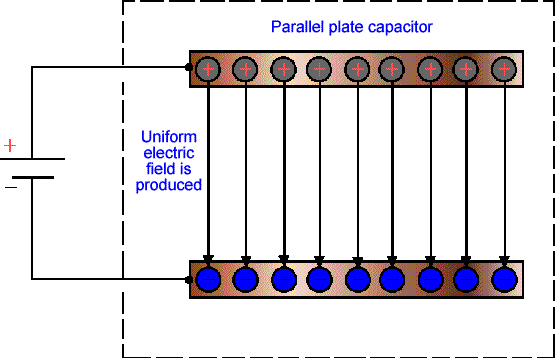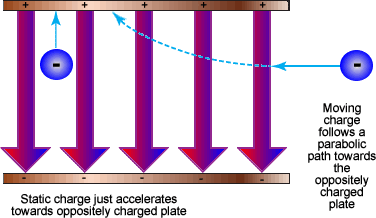    |
||||

Electric Field |
||||
|
There is a 'force field' around every electrically charged object. This force field can be detected and measured. It can cause electric charges to move in the field. The concept of electric field was introduced by Michael Faraday. When an object is charged electrically, there is either a greater (giving a negative charge) or a smaller (giving a positive charge) concentration of electrons than when the object is neutral. This creates a potential gradient - a difference of potential, or a voltage in the area around the object..
This invisible field of force is represented by field lines that are drawn to show the paths along which the force acts. The lines representing the electric field are drawn in the direction that a single positive charge would normally move under the influence of that field. A large electric force is shown by densely drawn lines; a weak force is indicated by widely spaced lines. When a capacitor is connected across a source of voltage, such as a battery, it is charged by a particular amount, depending on the voltage and the value of capacitance. This results in an electric field between the plate. Charged objects that pass between these plates will experience a force - positively charged objects experience the force in the direction of the electric field lines - negatively charged objects experience it in the opposite direction. Forces make an object accelerate according to F = ma - so the charged particles will accelerate as they pass between the plates. If you fired a proton between evacuated parallel plates the proton would follow the same path as a projectile moving under the Earth's gravity. Its horizontal velocity component would remain constant but in the vertical direction it would accelerate uniformly - this would result in a parabolic path.
See also - electric field strength and electric potential and Alpha scattering
|
||||
 |
||||




 If you fired an electron between evacuated parallel plates the electron would follow the same shaped path as a projectile moving under the Earth's gravity. Its horizontal velocity component would remain constant but in the vertical direction it would accelerate uniformly - this would result in a parabolic path towards the upper plate - it would 'fall' upwards!
If you fired an electron between evacuated parallel plates the electron would follow the same shaped path as a projectile moving under the Earth's gravity. Its horizontal velocity component would remain constant but in the vertical direction it would accelerate uniformly - this would result in a parabolic path towards the upper plate - it would 'fall' upwards! 
